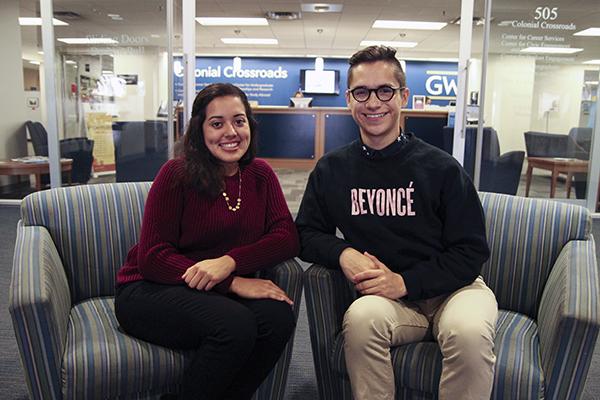Updated: Feb. 22, 2016 at 12:16 p.m.
When Miguel Mejia arrived on GW’s campus three years ago as a member of the first generation of his family to attend college, he didn’t like to talk about his first-generation status.
“I don’t know why,” Mejia, a senior, said. “I guess it’s because I didn’t want people to pity me, I don’t want people to think I’m less than them. I hid it because I wanted to show people that I can do well.”
But starting this semester, Mejia, who is employed by the Center for Student Engagement, will be able to use his first-generation status to help others with new office hours hosted through the student engagement office specifically for that group. Mejia, who co-founded a student organization earlier this year to advocate for first-generation students, said the one-on-one meetings will be an important chance for students to connect with one another and share their experiences.
“We’re not there as officials. We’re there as students who understand what you’re going through,” Mejia said. “We’re there if you want to get help or sometimes we just talk about life.”
Associate Dean of Students Tim Miller said the office hours came from a combination of student interest and feedback from officials who were first-generation college students.
“They provide a dedicated space where first-generation students can interact with a peer and/or a staff member to receive tips or be connected to campus resources,” Miller said.
The office hours will be held one afternoon per week for two hours, Miller said. This year, the Center for Student Engagement also started hosting dinners for first-generation students on the first Friday of each month.
Vice Provost for Enrollment Management and Retention Laurie Koehler, who was a first-generation college student at the University of Virginia, said efforts like the office hours are “of tremendous value” to GW’s goal of retaining and graduating more students. Koehler also attended the first-generation students dinner in January, Miller said.
“Our team members in the enrollment management and retention division are really pleased with the work of the CSE to provide avenues for our GW students who are among the first in their families to go to college to connect with each other and with supportive staff members,” she said.
Two years ago, GW eliminated a peer-mentorship program for all freshmen in favor of focusing on specific groups of incoming freshmen, like first-generation students.
This fall, GW received roughly 1,100 more undergraduate applications from first-generation students than last year, an increase which experts said will force GW to sharpen its focus on supporting that population.
Retention has been a nationwide issue with first-generation students: Just 27 percent of those students earn an undergraduate degree within four years, compared to 42 percent of students whose parents attended college, according to a 2011 study conducted by the UCLA Graduate School of Education.
Emily Rauscher, a University of Kansas sociology professor who has studied first-generation college students, said the population faces a host of challenges during their college experience: paying for school, navigating bureaucracy and heavy course loads, and establishing an identity on campus.
She said those challenges can be worse at a private school like GW, where campus culture can encourage students to spend money on the weekends or make part-time jobs seem optional.
“There’s no awareness that someone might not be from an advantaged background, or not be able to apply to graduate school or go out on a Friday night. That might further generate alienation and incentivize them to hide their true identity,” she said.
Louis Macias, the director of admissions and pre-college programs at the University of Wisconsin-Madison, said office hours for first-generation students are a good starting point, but he said to make a significant difference, the offerings would have to “evolve to figure out how to make GW an ever better place for these students.”
Macias said universities need to rethink the way they deal with first-generation students to not just push them toward graduation, but to make their college experience as well-rounded as those of students from more privileged backgrounds.
“To some extent we create our own realities,” he said. “Essentially we are bringing in students from a different academic profile than other students and instead of challenging these students to rise, we work at the fringes and say we’re going to mandate tutoring hours and just focus on how we can get you to graduate. That’s not something we do with other students.”
This post was updated to reflect the following correction:
The Hatchet incorrectly reported that Laurie Koehler is the vice provost for enrollment management. Her title was recently changed to Vice Provost for Enrollment Management and Retention. We regret this error.







